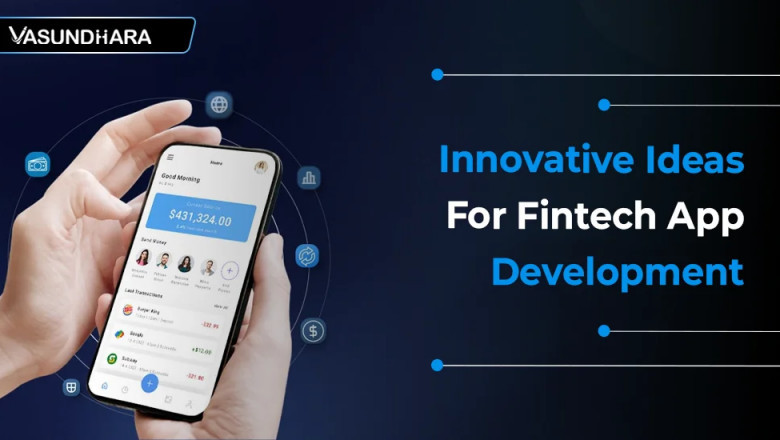views
The financial technology (fintech) industry has revolutionized the way we manage money, invest, and conduct financial transactions. With the rapid advancement of digital technologies, fintech application development has become a crucial area for businesses seeking to deliver innovative financial services and experiences.
This comprehensive guide explores the critical aspects of fintech application development, from its benefits to the development process and best practices.
What Is Fintech Application Development?
Fintech application development refers to the design, development, and deployment of digital applications that facilitate financial transactions and services. These applications range from mobile banking apps and payment gateways to blockchain-based solutions and robo-advisors.
Fintech applications enhance efficiency, accessibility, and security in financial operations, making them indispensable for both consumers and businesses.
Benefits of Fintech Application Development
1. Enhanced Financial Accessibility
Fintech applications democratize access to financial services, allowing users from diverse backgrounds to manage their finances with ease.
2. Increased Efficiency
Automation and streamlined processes reduce manual effort, ensuring quicker and more accurate financial transactions.
3. Improved Security
Advanced encryption techniques and blockchain technology ensure robust security, protecting sensitive user data and financial assets.
4. Personalization
With AI-driven analytics, fintech apps offer personalized insights, recommendations, and financial advice tailored to individual needs.
5. Global Reach
Fintech applications facilitate cross-border transactions, making financial services accessible on a global scale.
Key Features of Fintech Applications
1. User Authentication and Security
Security is paramount in fintech apps. Features like biometric authentication, two-factor authentication (2FA), and end-to-end encryption ensure user data safety.
2. Seamless Payment Integration
Fintech apps support multiple payment options, including credit cards, digital wallets, and cryptocurrencies, ensuring a smooth transaction experience.
3. Real-Time Notifications
Push notifications keep users updated on transactions, account activity, and personalized offers.
4. AI-Powered Analytics
AI enables fintech apps to provide data-driven insights, spending analysis, and financial forecasts.
5. Blockchain Integration
Blockchain technology enhances transparency, reduces fraud, and facilitates secure peer-to-peer transactions.
Fintech Application Development Process
1. Market Research and Strategy Development
Understanding user needs and market trends is crucial for creating a fintech app that stands out. We conduct in-depth research to define your target audience and competitive landscape.
2. Choosing the Right Technology Stack
Selecting the appropriate technology stack is critical for ensuring scalability, performance, and security. We use cutting-edge frameworks like React Native, Node.js, and blockchain platforms for robust development.
3. UX/UI Design
User experience (UX) and user interface (UI) design play a vital role in fintech apps. Our designers create intuitive and aesthetically pleasing interfaces that enhance user satisfaction.
4. Development and Testing
Our agile development methodology ensures the app is built efficiently and tested rigorously for bugs, vulnerabilities, and performance.
5. Deployment and Maintenance
After successful testing, the app is deployed on relevant platforms (iOS, Android, web). Post-fintech app development services, we provide regular updates and support to ensure optimal performance.
Fintech Application Solutions for Various Sectors
1. Digital Banking
-
Mobile Banking Apps: Enable users to check balances, transfer money, and manage accounts securely.
-
Loan Management Solutions: Simplify loan applications and approvals with automated workflows.
2. Payment Gateways
-
E-Wallets: Facilitate quick and secure payments through digital wallets.
-
POS Solutions: Streamline transactions for merchants with point-of-sale integrations.
3. Wealth Management
-
Robo-Advisors: Provide automated investment advice based on user preferences.
-
Portfolio Management Tools: Help users track and manage their investments in real time.
4. Insurtech
-
Policy Management Platforms: Simplify the process of buying, renewing, and managing insurance policies.
-
Claim Processing Systems: Automate and accelerate the claim approval process.
5. Cryptocurrency and Blockchain
-
Crypto Wallets: Enable secure storage and transactions of cryptocurrencies.
-
Smart Contracts: Automate and enforce contract terms using blockchain technology.
Challenges in Fintech Application Development
1. Regulatory Compliance
Fintech apps must comply with regulations like GDPR, PCI DSS, and AML laws, which vary across regions and industries.
2. Data Security
Ensuring robust security against cyber threats is a major challenge in fintech development.
3. Scalability
As user bases grow, fintech applications need to handle increased traffic and data without compromising performance.
4. Integration with Legacy Systems
Many financial institutions rely on legacy systems that must be integrated with new fintech solutions without disrupting operations.
Best Practices for Fintech Application Development
1. Prioritize Security
Incorporate advanced security features like encryption, tokenization, and real-time threat detection from the start.
2. Focus on User Experience
Develop user-centric designs that make navigation and transactions intuitive and efficient.
3. Embrace Agile Methodologies
Agile development ensures flexibility and faster delivery, enabling timely updates based on user feedback.
4. Leverage Emerging Technologies
Integrate AI, blockchain, and IoT to offer innovative features that set your fintech app apart.
5. Test Rigorously
Thorough testing at every stage of development ensures that your app meets the highest standards of quality and reliability.
Future Trends in Fintech Application Development
-
Open Banking APIs: Enhanced interoperability between banks and third-party apps for a seamless user experience.
-
Embedded Finance: Integrating financial services into non-financial platforms to reach more users.
-
Decentralized Finance (DeFi): Leveraging blockchain for trustless and transparent financial systems.
-
AI and ML Applications: Advanced AI and machine learning models for fraud detection, credit scoring, and personalized financial advice.
Fintech application development is the key to driving innovation and staying competitive in the fast-paced financial services sector. By embracing cutting-edge technologies and best practices, businesses can create solutions that deliver value, security, and convenience.














Comments
0 comment